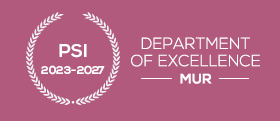MUR Department of Excellence 2023-2027
Department of Psychology “Renzo Canestrari” confirmed as a Department of Excellence for the 2023–2027 term

What is a Department of Excellence?
Every five years, the Italian Ministry of University and Research (MUR) selects and funds the top 180 Departments from Italian state universities, based on the quality of their research and the strength of their proposed development plan. These are the Departments that stand out for their excellence and capacity for innovation.
A path of continuity and innovation in research, education, and societal impact
For the second consecutive five-year term, the Department of Psychology “Renzo Canestrari” has been selected among the Departments of Excellence in Italy, receiving a special grant of €6,750,000 from the Ministry of University and Research. This important recognition builds on the results achieved in the 2018–2022 cycle and supports a new phase of development for the 2023–2027 period.
The new project continues the strategic direction set by the previous one, while introducing new lines of action in response to the global transformations of our time: health and environmental crises, international conflict, and emerging social and educational inequalities. In this context, the Department has developed an integrated vision, designed to produce innovative scientific knowledge, train highly qualified professionals, and generate a concrete, positive impact on society.
Strategic objectives
At the core of the programme are two major thematic areas that guide research, advanced training, and third mission activities:
- The first focuses on the development of theoretical models to explain human behaviour in critical and emergency conditions. As demonstrated by recent pandemics, armed conflicts, and ecological and social crises, individuals and communities are called to face increasingly complex challenges that require flexible, adaptive responses. The Department aims to explore these processes from a multidisciplinary and cross-sectoral perspective, addressing psychological, neural, social, and emotional mechanisms, while taking into account individual differences, life stages, and socio-educational contexts, with particular attention to vulnerable populations.
- The second area is dedicated to the design of flexible, personalised, and sustainable psychological intervention models that can promote health and well-being across diverse life contexts. These interventions will integrate advanced technologies such as digital health, robotics, and machine learning. The models will be tested in educational, clinical, organisational, and environmental settings, involving children, adolescents, adults, and older individuals, with particular focus on their effectiveness, accessibility, and sustainability.
The project involves 34 research groups, 19 laboratories, and 3 research centres, and is linked to PNRR partnerships and competitive projects funded through Horizon Europe, with a strong focus on the Health and Inclusive Societyclusters.
An integrated plan for quality
Alongside its research focus, the project also significantly enhances university and postgraduate education. The PhD programme in Psychology has adopted English as its official language and fully integrated the project’s themes into its educational tracks. Newly habilitating Master’s degrees now include practical internship modules related to the most pressing societal challenges, giving students the opportunity to engage directly with current research and real-world issues.
A strong emphasis is placed on internationalisation, with mobility grants, dual degree programmes, high-level visiting professors, and long-standing collaborations with leading universities and research centres around the world. These efforts aim to increase the Department’s attractiveness to both students and researchers.
The recruitment of new researchers and faculty in key areas is a key pillar of the project. It supports the renewal of academic talent and reinforces the Department’s ability to compete for national and international research funding. Recruitment is also extended to technical-administrative staff, who will support the implementation of research and project management activities.
In terms of infrastructure, the project includes significant investments for the modernisation of laboratories, the energy efficiency of buildings, and the expansion of the Cesena campus, creating state-of-the-art, sustainable spaces for teaching and research.
Third mission and social impact
A strong commitment to knowledge transfer and public engagement continues to guide the Department’s mission. Psychological services are offered to students, families, and the broader community, including in English, and are complemented by collaborations with companies and public institutions, public outreach initiatives, and the development of spin-offs. Scientific expertise is made available to local, national, and international communities to address real-world challenges and contribute to a more inclusive, equitable, and resilient society.
Monitoring and sustainability
The project includes a rigorous monitoring system, with annual assessments of quality indicators and a mid-term external review. Monitoring is managed by an internal committee and external international experts. All planned actions are designed to generate long-term impact and to consolidate the Department’s capacity to attract resources, train new generations of scholars and professionals, and effectively address the complex challenges of contemporary society.
Recruitment: Investing in research talent and strengthening technical-administrative support
A central component of the project is the strategic recruitment of new academic staff, aimed at enhancing the Department’s scientific expertise and innovation capacity. Over the five-year period, the Department will appoint three tenure-track researchers (RTDB) and one Associate Professor, in disciplinary areas closely aligned with the thematic focuses of the project.
Additional positions will be supported through project-based funding, including resources from ERC and Horizon Europe grants.
The recruitment effort also includes the expansion of the technical-administrative staff, with the hiring of a dedicated managerial professional to coordinate project activities, facilitate access to competitive funding calls, and strengthen collaborations with national and international partners.